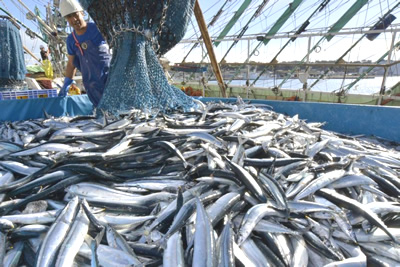Reports of the death of fisheries discussions in the World Trade Organization have been greatly exaggerated says the chairman of its rules negotiating group.
Although the World Trade Organization’s member countries have failed to reach an agreement on how they should subsidize their fishing fleets and industries, to pronounce the negotiations dead would be premature, said Roberto Zapata Barradas, the WTO’s rules negotiating group chairman.
Mr. Zapata Barradas, who is also Mexico’s ambassador to the WTO, was speaking during an opening-day session of UNCTAD’s Second Oceans Forum, meeting in Geneva, Switzerland on 16 and 17 July.
With one third of global fish stocks at biologically unsustainable levels, everyone seems to agree that something must be done. And in September 2015, global leaders set their sights on tackling the fisheries subsidies that facilitate overfishing – such as fuel subsidies, which make it affordable for industrial fleets to plunder the deep seas.
To fix the situation and help safeguard a precious source of food and jobs – around 200 million jobs are related to fishing and seafood provides 20% of animal protein for 3.2 billion people – 2015 saw the setting of a specific target for fisheries subsidies within the Sustainable Development Goals.
Target 6 of Goal 14 calls for an end by 2020 to subsidies that lead to overcapacity and overfishing or contribute to illegal, unreported and unregulated (IUU) fishing.
And since the WTO has been tasked with the job, all eyes were on the organization when it met for its most recent ministerial conference in December 2017 in Buenos Aires.
But while the lack of a concrete outcome was seen a setback, Mr. Zapata Barradas said that “reports of the death of the fisheries discussion in the WTO have been greatly exaggerated”.
“On the contrary,” he said, “they are [very] much alive and present in the technical discussions.”
Common ground
But Mr. Zapata Barradas warned that the deadline is right around the corner and urged ministers “to empower their negotiators to be creative and exercise flexibility to find common ground.”
Dealing with fisheries subsidies has been on the WTO agenda for almost two decades and continue to drag on despite consensus on the need to discipline fisheries subsidies, negotiations continue to drag on.
For some involved in the negotiations, the discussions continue because the issues are politically sensitive and technically complex and, more importantly, fall outside the normal scope of the organization.
According to Mere Falemaka, the Pacific Islands Forum’s permanent representative to the United Nations and WTO in Geneva, “This is not a straight-forward WTO agreement about trade rules that affect trade competition.”
“It’s about the effect of trade rules on fish stocks. It’s not about dealing with trade distortions,” she said.
“These are complex fisheries management issues. The WTO is not a fisheries management organization.”
Indeed, the subject ties together different policy strands, including trade law, social development and environmental protection. And negotiators must strike a deal that meets the diverse interests of the WTO’s 164 members.
“We have to balance the interests of developed and developing countries,” she said, “not only the level of development in general, but also the development of the fisheries sectors [in each country].”
“Then we have to balance the rights of the different countries depending on whether they are coastal states or whether they are flag states or subsidizing states,” she said.
Complex dynamics
In addition, negotiators must figure out how to deal with good subsidies – those that contribute to fisheries conservation and management – and subsidies that fall into grey areas.
“These are questions that members are facing and that are complicating the discussions,” she said.
And since decisions in the WTO are legally binding, governments are more cautious.
Mr. Zapata Barradas said: “Let us not forget that when pursued in the WTO, an agreement in the area of fisheries not only means endeavoring to agree actual rule making but to do so in a manner that the disciplines be binding and thus subject to dispute settlement, meaning that they will be enforceable, and members will be accountable.”
“And as we all know, this can make all the difference when it comes to complex negotiating dynamics,” he said.
For Lucas Assunção, in charge of UNCTAD’s trade, environment, climate change and sustainable development branch, another challenge is a lack of data that everyone agrees on, and on which negotiators can base their discussions.
There are two main sources of data on fisheries subsidies. The first is the University of British Columbia in Canada.
“There we have quite an important centre. But this data does not yet have third party validation. So some do not take it as the ultimate figures,” Mr. Assunção said.
The second source, he said, comes from the Organisation for Economic Co-operation and Development but only covers its members and some observers.
Failure is not an option
“However, insufficient data on the magnitude of the problem and lack of transparency should not stand in the way of finding a multilateral solution by 2019, or at the latest by 2020,” Mr. Assunçao said.
Anders Jessen, the European Commission’s acting director for international ocean governance and sustainable fisheries, agreed, saying that WTO members – and the world – have a lot to lose if they don’t get the negotiations right.
“Trade negotiators have the eyes of world upon them. And there is as always a political price to pay for failure,” Mr. Jessen said.
Mr. Jessen added: “In a year’s time, it will be in the WTO where the world will see how the global community will honour Agenda 2030.
“It would be a tragedy if Goal 14 were the first global Sustainable Development Goal failure that would emerge.”

